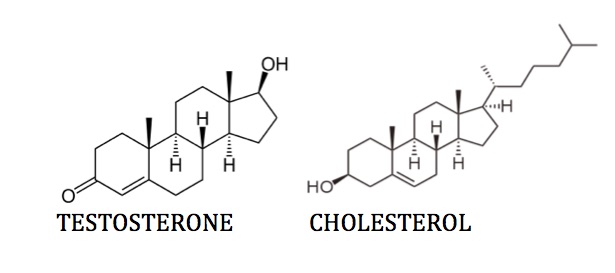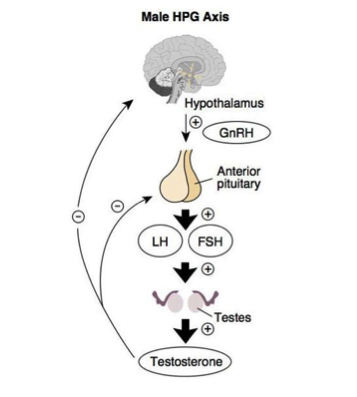Optimizing Testosterone Levels
Dr. Sheldon Bjorgaard, ND
What is Testosterone?
Testosterone is a very important hormone for both men and women, but it is critical in men due to its potent androgenic and anabolic effects. Healthy testosterone levels are associated with increased quality of life in males and anti-aging effects.
Testosterone is a steroid hormone due to its chemical structure. All steroid hormones are made from cholesterol in the body, which in turn is consumed from dietary sources, or produced in the liver. Therefore a healthy, balanced, whole foods diet including healthy fat sources is important in supporting optimal testosterone levels.

How is Testosterone made?
In order to make testosterone from cholesterol, a signal must be given from the brain in the form of another hormone called Gonadotropin Releasing Hormone (GnRH). GnRH stimulates a gland in the brain called the pituitary gland to release stimulating hormones (FSH, LH) which in turn stimulate the production and manufacturing of testosterone in the testes. Once enough testosterone is produced it is detected in the blood stream and sends feedback to the brain. Conversely if there are low testosterone levels in the blood, signals will be sent to increase the secretion of GnRH, FSH, and LH in order to produce more testosterone. This relatively complex mechanism is known as the Hypothalamus-Pituitary-Gonadal (HPG) Axis.
How do I know if I have enough T?
There are several methods of testing testosterone levels in the body including conventional blood tests, saliva and urine testing. Each of these methods has its pros and cons, and depending on the lab utilized each would have different normal values. In addition, normal values for different adult age ranges have not been established, making the diagnosis of low testosterone a difficult one. Ideally both total and free testosterone, in addition to several other hormones would all be measured in order to identify causal or contributing factors in the diagnosis of low testosterone.
Since every individual has unique physiology, one may not show symptoms of low testosterone even though their levels are on the lower end of the normal range. This may be the result of an increased sensitivity of testosterone receptors or a higher proportion of free or active testosterone in relation to protein bound testosterone. Thus any lab result must be interpreted in the context of signs and symptoms with the guidance of a health care professional.
Signs and symptoms associated with Low Testosterone
- Obesity or being overweight
- Low energy and strength, loss of “vigor”
- Loss of libido, erectile dysfunction
- Brain fog, depression, difficulty concentrating
- Poor sleep quality
As the majority of these signs and symptoms are non-specific, they may be indicative of other physiological processes or hormonal dysfunctions other than testosterone. Therefore these are by no means “diagnostic” of low testosterone in and of themselves.

Factors that Increase Testosterone
- Losing excess body fat
- Stress reduction and improved sleep quality
- A healthy, whole foods diet with the right amount of calories and healthy fat sources
- Resistance training
- Reducing or limiting alcohol consumption
It is important to consider that there can be many different causes of low testosterone in men and women. These include poor nutritional status, alcoholism, brain tumors, certain medication side effects, genetic abnormalities, and certain cancer treatments. Signs and symptoms of low testosterone may also result as an imbalance in the ratio of testosterone to other hormones in the body. Hormones such as estrogen and cortisol may also be elevated, causing similar symptoms as low testosterone. By identifying and addressing the root cause of hormonal imbalance or dysfunction, a comprehensive and targeted approach to low testosterone will be more beneficial and effective in improving one’s quality of life. This includes comprehensive testing, dietary and lifestyle modifications, in addition to nutritional supplementation if necessary.








